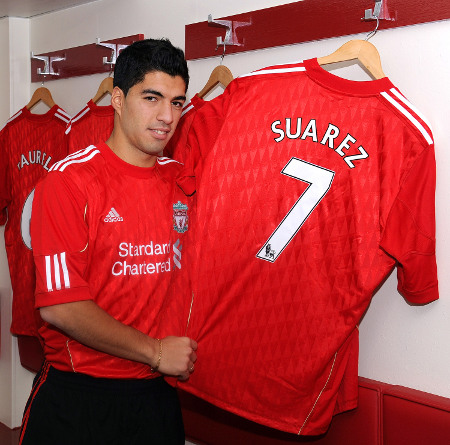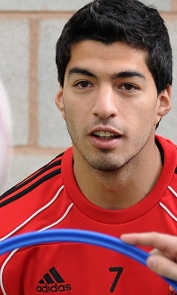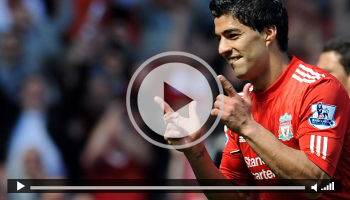Suarez 'the rebel' talks to .tv
You're a foreigner arriving at England's most successful club for a £20m-plus fee; you're given the No.7 jersey made iconic by your new boss; your would-be strike-partner has just left. You could be forgiven for feeling the pressure.
But if Luis Suarez was at all burdened following his January transfer from Ajax, he's a fine actor. The scorer of goals, the provider of assists - no player was more influential in Liverpool's late surge up the league table.
First-team coach Steve Clarke even claimed that no player since the great Gianfranco Zola had adapted so quickly to the English game.
That's why we sat down with the Kop's newest idol before he left for the Copa America (the final of which takes place between Uruguay v Paraguay tonight) to find out how he's done it.
Watch what Suarez had to say by clicking on the play button or read the full transcript below.
What makes Liverpool different from the other clubs you've played for?
Let's put aside for a moment the fact this club has many, many years of successful history and it's known throughout the world as a famous club. You need to look a bit deeper for the reason why Liverpool is different from any other club I've played for. On a human and personal level, if you look inside the dressing room, it takes a special kind of player to play here and you only really discover that when you come to the club and meet everyone in the dressing room. Just as importantly is Kenny Dalglish. I didn't know a lot about him before I came here but I know now I'm playing for a great manager. I knew he was a significant figure in the history of Liverpool but now I know the manager is a very, very important person. He has given me the opportunity to express myself and show what I can do here.
How much did you know about Liverpool when you were growing up?
Of course I remember Liverpool from growing up. They had a lot of great players at the club, particularly forwards. When you are mucking around as a kid you always have a dream of playing at that level and maybe playing for a club like Liverpool. I used to play around pretending to be some of those forwards as a kid.
Did you watch the 2005 Champions League final?
I certainly did, and I'm not the only person who'll remember it for a long time. Aside from the fact it was a great final, Liverpool also really demonstrated they had a spirit and the stomach for a fight. Almost a rebellious attitude in the way they came back. The team was packed full of characters and personalities and they certainly displayed that.
You talk about a rebellious attitude - is that something you share as a player?
When you are in the middle of a game, when you're involved with it rather than just watching, you experience and live a real intensity. That's something you can't appreciate from the sidelines. When you really want to do your best to win on every occasion, and when you'll do your upmost to win, that rebellious attitude, if you like, comes out automatically during a game.
How does it make you feel when the fans sing You'll Never Walk Alone?
It's a great source of motivation for me and the team. It's a well-known song throughout the world of football but when you actually hear it as you're about to go out on the field it's very, very emotional. It gives you a real lift and almost sends a shiver down your spine.
And the fans have a song for you as well - do you know the words?
[Laughs] I can understand the bit where they sing my name! But I'm not sure about the rest of the lyrics. I'm vaguely aware of the song. But the key thing is that when you've been somewhere such a short space of time and the fans give you a song, I suppose it shows you're doing your job quite well.

What are the differences between English and Dutch football?
Football is played in totally different ways in the two countries. Dutch football was an excellent step on the way up to English football for me. If I hadn't gone via Dutch football I think it would have been a difficult step, coming straight into English football. Dutch football allowed me the opportunity to improve my skills, hone myself as a player and improve a few little details here and there to make sure I was ready to play at the top level. When you come to England it's a lot more intense, the game. It's a higher tempo and you know anything came happen in the 90 or 95 minutes. It's a lot more aggressive and you've got to be ready for anything.
Have you been surprised at how quickly you've adapted?
It's something you always worry about if you move to a different type of football. I was totally aware that everyone was really watching closely. How's he going to adapt to English football? How's he going to settle in? You come here with a reputation and for a lot of money and so people are waiting for things to happen. I've always been of the opinion that if you do the same things you've done throughout your career on the field, if you just concentrate on doing that, then things usually come right. You have to put aside anything that might be difficult: settling in, the language, getting used to a different culture. Do your job on the field and things will come right.
What makes Kenny Dalglish different from the other managers you've worked for?
The biggest thing is the trust he puts in his players. He trusts us 100 per cent and that makes you want to return that trust and pay it back. We know he's had a long career in football, so we trust in his experience. He's not had that long career for no reason, so we value his expertise.
And how are you enjoying Liverpool the city - what kind of things have you been getting up to?
When you go somewhere new the first impressions are always good and you always like it, but maybe that veneer wears off. But that's not happened with Liverpool. I still like the place very, very much. I spend a lot of time at home with my family when I'm not busy playing, but I've had the chance to walk round and it's a really nice city.
How's your Scouse?
It's tough, I find it tough. Even my partner, who does speak pretty good English, struggles. One person might come along, maybe to do some work on our house or in a shop, and she'll understand them. Then the next person comes along and there's no chance.
What do you hope to achieve during your time in Liverpool?
When you play for a club like Liverpool, one of the biggest clubs in England, you've always got to have the aspiration of winning the title. You've got to believe with the quality we've got at this club that this can be a realistic possibility. But we know there is a lot of competition and there are a lot of other teams with the same objective. The next objective is to make sure you're in the Champions League places. We've got to have the confidence that we've got the type of quality here to be aiming for those things. We've got to have an excellent pre-season, prepare really well and then it's a case of being consistent through the season and have a good run of form - not just in flashes through the season.




